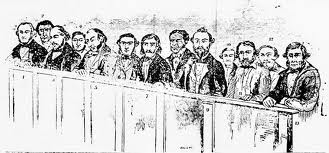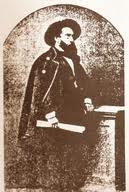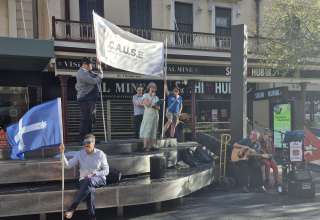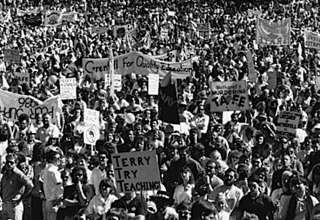The armed conflict at Eureka has great significance for Australians. It was a major class struggle that saw civil conflict developed into an armed battle. The diggers, who were independent workers, quickly became hostile to the Crown and a Legislative Council who represented the big merchant and pastoralist class imposing taxes on them. This was galling to the diggers who had no rights to political representation. In their eyes a kleptocracy denied them democracy and tax equity.
For the colonial state (dominated by the merchants and pastoralists), the miners were considered a political threat. Workers preferred to go off to the gold fields rather than labour as wage earning ‘slaves’ caused big business consternation. They were finding it hard to attract employees to work for them. Therefore licenses were only to be issued to labourers who “had been properly discharged from employment or were not otherwise improperly absent from hired services”.
Eureka now symbolizes all workers’ rights and is a much used emblem by the union movement. The influx of peoples from around the globe into Victoria in 1850s is one of many examples of the culturally diverse nature of settlement in Australia.
Being mindful that culturally diverse Aboriginal Australia had initially been disposed of their sovereignty and cruelly oppressed and that the Chinese miners had also been racially vilified and violently persecuted (in particular at Lambing Flat, now Young, NSW in the 1860s) Australia’s ‘gold rush immigration’ had created a culturally diverse society even back then. For racial supremacists who rant on about a mono-cultural Australia (e.g. Pauline Hanson’s One Nation), Eureka is an awkward revelation for them.

Amongst the more than 20 nationalities that united under the Eureka flag were two African-Americans, John Joseph from the United States and James Campbell, a Jamaican (Central America). They were placed on trial as ring leaders.
As the Italian, Raffaello Carboni, one of the Eureka rebel leaders called on the diggers, “…irrespective of nationality, religion, and colour to salute the Southern Cross (Eureka) flag as the refuge of all oppressed people from all countries on earth.”

Understandably, the broad, revolutionary sentiments that people brought with them onto the gold fields caused them to have little time or respect for the British Crown and consequently the colonial authorities.
The manner in which the unfair tax was policed so agitated the miners they threatened succession for the colony of Victorian from the United Kingdom. The newspapers of the time and Governor Hotham described the Eureka flag and its rebellion as ‘the flag of Australian independence’. These expressions of republicanism and independence were widespread in the Australian colonies and were taken seriously by the Colonial authorities.






